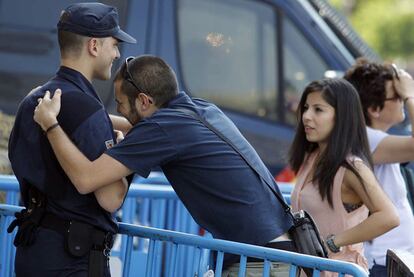Spaniards go the polls after campaign marked by street protests
Turnout figure holding up so far after demonstrations which saw Madrid's Sol square filled by up to 30,000 people, with other Spanish cities staging their own sit-ins

Protests in Madrid's Puerta del Sol and in more than 150 other cities across Spain continued through to Saturday night despite a ruling by the country's electoral board prohibiting any types of demonstrations before Sunday's ballot. As morning voters cast their ballots a few hundred protestors remained in Madrid's Puerta del Sol at midday Sunday.
The Supreme Court turned down an appeal filed by the United Left (IU) Party against the Central Electoral Board to lift the prohibition for the so-called "day of relection" period of 24 hours, which started at midnight on Friday.
In a five-to-four vote, with one abstention, board members had ruled late Thursday that the May 15 Movement cannot hold any type of demonstrations or protests for 24 hours beginning on Saturday.
The demonstrators were mostly young people, grouped together after marches were held on May 15 against the failure of Spain's political leaders to provide solutions to unemployment and the low-wage economy. Over 20 percent of Spaniards are out of work and youth unemployment stands at around 40 percent.
Deputy Prime Minister Alfredo Rubalcaba did not say on Friday how the law enforcement authorities would act, but suggested to reporters that the police would not dislodge the demonstrators who are camped out in Madrid's Sol square.
"What we are going to do is fulfill the constitutional mandate and the security forces will uphold the laws, and for that reason, we will act in a timely fashion with conformity and proportionality. We don't want to create another problem, or even two or three more," he said.
Earlier on Friday, Zapatero said in a radio interview that the government would act "intelligently" in its dealings with the illegal protests.
In the end, security forces limited their actions after midnight to informing the protest leaders that the sit-ins were now illegal.
For their part, May 15 Movement organizers said they plan to stay in Sol but won't be calling for any specific protests. They explained that they simply will not dissuade anyone who wants to also gather at the square.
Festive plans for Saturday in Sol include wrapping the square in yellow paper, in honor of the name of the square, and setting up a giant screen onto which live images of the other sit-ins across Spain will be projected.
Much of the discussion among the protestors centers on whether to vote in Sunday's nationwide local elections. Many regional parliaments, including that of Madrid, are also to be elected. Many of the protestors' slogans have been aimed equally at the ruling Socialists and the conservative Popular Party opposition, with complaints that the rivalry between the two great parties has poisoned the political atmosphere preventing real action being taken to solve the country's problems. Many protestors also point to what they see as widespread corruption among the political class.
The Socialist Party is bracing for a poor showing in Sunday's elections, while the PP in Madrid seemed slightly rattled at the idea that the protests might play out badly for them at the ballot box. Madrid premier Esperanza Aguirre said on Friday she was considering mobilizing the 90,000 PP members in the capital region - "there are more of us than there are in Sol" - and demonstrating outside the Socialist Party HQ in Ferraz street, in a hint that the Interior Ministry run by Deputy PM Alfredo Pérez Rubalcaba was deliberately not enforcing the law by breaking up the protests.
The police estimate that some 28,000 people were in Sol on Friday night, with many more occupying surrounding streets. In Valencia, at least 10,000 people gathered in the square in front of City Hall, with Málaga and Barcelona both seeing protests number over 5,000, according to official figures. Demonstrators also gathered outside Spanish diplomatic missions in cities across the world, with some 600 converging on the embassy in Brussels.
Tu suscripción se está usando en otro dispositivo
¿Quieres añadir otro usuario a tu suscripción?
Si continúas leyendo en este dispositivo, no se podrá leer en el otro.
FlechaTu suscripción se está usando en otro dispositivo y solo puedes acceder a EL PAÍS desde un dispositivo a la vez.
Si quieres compartir tu cuenta, cambia tu suscripción a la modalidad Premium, así podrás añadir otro usuario. Cada uno accederá con su propia cuenta de email, lo que os permitirá personalizar vuestra experiencia en EL PAÍS.
¿Tienes una suscripción de empresa? Accede aquí para contratar más cuentas.
En el caso de no saber quién está usando tu cuenta, te recomendamos cambiar tu contraseña aquí.
Si decides continuar compartiendo tu cuenta, este mensaje se mostrará en tu dispositivo y en el de la otra persona que está usando tu cuenta de forma indefinida, afectando a tu experiencia de lectura. Puedes consultar aquí los términos y condiciones de la suscripción digital.








































